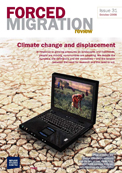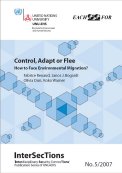(Reuters AlertNet) October 5, 2010 – YAOUNDE, Cameroon – Yaounde’s Briketteri neighbourhood, home to Muslim traders in textiles and beef, is seeing a surge of climate migrants – farmers and fishermen fleeing fast-drying Lake Chad to the north.
Aisha Alim 42, a former Lake Chad farmer, now earns a meager leaving selling fried peanuts in Briketteri after watching his farmland near Lake Chad run out of water.
“It has been a bitter reality to swallow and a battle for survival,” he said. “The desert keeps encroaching on farmland
as the water recedes and this makes it difficult for farming activity to thrive. I used to grow onions, peppers and maize but my farming area turned dry and I had no choice except to relocate.”
Mahmadou Bello, 52, who once fished in Lake Chad, similarly brought his wife and six children to Cameroon’s capital two years ago when the lake could no longer provide enough fish.
“We used to make enough money as fishermen by the shores of the lake and my wife was also involved in fish smoking because there was enough catch,” he said. Now, however, he has had to take up work as a butcher to support his family, he said.
Lake Chad, a large shallow freshwater lake that borders Chad, Niger, Nigeria and Cameroon, has shrunk in size by as much as 90 percent over the last four decades, forcing a growing number of farmers, fishermen and herders who depend on it to seek new livelihoods elsewhere.
A recent study by NASA and the German Aerospace Centre blames climate change – particularly more erratic rainfall – and human activity – including population hikes, overgrazing and overuse of lake water for irrigation – for the gradual disappearance of one of Africa’s biggest lakes.
The study warns that urgent action is needed by members of the Lake Chad Basin Commission (LCBC), charged with overseeing the water body, to avoid further dramatic shrinking of the lake, which provides water or livelihoods for more than 20 million people in the region.
FEAR OF POTENTIAL CONFLICTS
At the last World Food Security Summit in Rome, Libyan leader Muammar Gaddafi sounded a warning on the dangers associated with Lake Chad’s decline, saying the loss of water might well spur serious conflict in the region.
“Something has to be done to save Lake Chad from the advancing desert. If it dries up it will be a real danger not only to the basin population but to the entire African continent that depends on the fish and agricultural products from the area,” he argued.
Already there are growing conflicts among herders scrambling for limited pasture and fishermen fighting over declining stocks of fish, as well as confrontations – including some violent clashes – between migrating herders and fishermen and the people already living in the new communities where the migrants settle.
“In Nigeria and Cameroon, cattle herder migrants who move southward end up competing for land resources with host communities. This has led to some of the recent conflicts between herders and farming communities in northeastern Nigeria and the Adamawa region of Cameroon,” a report by the Lake Chad Basin Commission said.
Water shortages are already causing a serious shortage of animal feed in the Lake Chad region, resulting in cattle deaths and plummeting livestock production, the report said.
On the whole, average household income in the region has fallen by more than half in recent years, the study said, and fish catches that hit 140 metric tons a year in the 1960s and 1970s have now fallen to below 80,000 metric tons a year.
Farming – which employs over half of the lake basin’s population – also has been hard hit, producing growing food scarcity, said Abdullam Urmar, executive secretary
of the Lake Chad Basin Commission.
Of the 1.6 million hectares that would benefit from irrigation in the lake drainage area, only 115,000 hectares are actually irrigated, largely as a result of falling water levels, he said.
SAVING THE RECEEDING LAKE
Efforts to stem the problems at Lake Chad are complicated by the fact that so many countries are involved.
According to Aboubakari Sarki, Cameroon’s minister of livestock, fisheries and animal husbandry, protecting the lake cannot be the work of a single country.
“This is a decision that has to be taken by the five member countries of the commission – Cameroon, Chad, Niger, Nigeria, and the Central African Republic. More so, the commission is under the supervision of the United Nations Development Programme (and) that has to be consulted,” he said.
One of the measures put in place by the commission already to try to protect the lake is strict regulation of the use of its water under a standing charter signed in 1994 by the lake’s neighbors and other lake water users in the region, including Algeria, Sudan and Libya.
Other proposals include channeling the water of the Oubangui River in the Central African Republic to Lake Chad, an effort that has yet to find funding.
Patrick Akwa, Cameroon’s secretary general of the Ministry of Environment, said the feasibility study alone for the project would cost more than $50 million.
“The project involves damming the Oubangui River at Palambo in the Central African Republic and channeling some of its water through a navigable canal to Lake Chad,” he said.
Elias Ntungwe Ngalame is an award-winning environmental writer with Cameroon’s Eden Group of newspapers.
Source: Reuters AlertNet




SUCCESS OF THIS PROJECT WILL GO ALONG WAY IN CHANGING THE LIFE PATTERN OF THE PEOPLE LEAVING IN THE AFFECTED AREAS.MY RECENT VISIT TO THE AFFECTED REGION ALONG NIGERIA CAMEROON BORDER SPELLS DISASTER IF TIMELY INTERVENTION TO REVERSE THE TREND IS NOT ATTENDED TO IN GOOD TIME.I WISH TO APPEAL TO EVERY STAKE HOLDER ESPECIALLY NIGERIA AND OTHER DORNER AGENCIES TO MAKE MAKE IT A PRIORITY.